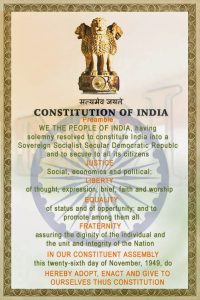PREAMBLE
WE,
THE PEOPLE OF INDIA, having solemnly resolved to constitute India into a
SOVEREIGN SOCIALIST SECULAR DEMOCRATIC REPUBLIC AND TO SECURE TO ALL ITS
CITIZENS:
JUSTICE,
social, economic and political;
LIBERTY
of thought, expression, belief, faith and worship;
EQUALITY
of status and of opportunity;
and
to promote among them all ---
FRATERNITY
assuring the dignity of the individual and the unity and integrity of the
Nation;
IN
OUR CONSTITUENT ASSEMBLY THIS TWENTY SIXTH day of November 1949, do HEREBY
ADOPT, ENACT AND GIVE TO OURSELVES THIS CONSTITUTION.
·
Concept has been
taken from USA.
·
Language has
been taken from France.
·
The Preamble is
a preface or an introductory part of the Indian Constitution or a key to
understand the constitution.
·
The basic structure
of the constitution has been stated under the Preamble.
·
Indian Preamble
is based on J.L. Nehru’s “Objective Resolution.”
·
It was moved by
Mr. Nehru on 13th December.
·
It was adopted
by the assembly on 22nd January 1947.
·
Preamble is
non-judiciable.
·
Indian Preamble
has been amended only once by 42nd Amendment Act, 1976.
·
By the 42nd
Amendment Act three words have been added to the preamble, by the
recommendation of Saran Singh Committee: Socialist,
Secular and Integrity
·
The source of
authority of Indian Constitution is people
of India.
·
According to the
preamble the nature of Indian at the commandment of the constitution of Sovereign, Democratic & Republic
·
Indian
Constitution has a preamble – it indicates that it is written.
·
Sovereign: It
refers to the absolute power of the Government of the Country.
o Sovereign is two types: Internal and External
i)
Internal Sovereignty: It means the law of the states ultimate and absolute
within the territory of the state and all the citizens have to obey the law.
ii)
External Sovereignty: It means India is independent and is not controlled
by other countries and nations.
·
Socialist: It
is added by 42nd amendment Act, 1976. It refers to a system where
all means of production and distribution shall be controlled by the state. But
the Indian brand of socialism is “Democratic Socialism” where the public and
private sector co-exist side by side that is mix-economy. The main purposed of
democratic socialism is to reduce inequality between the rich and the poor.
·
Secular:
It is added by 42nd Amendment Act, 1976. It refers to equal respect
and equal protection of all religions by the Government.
o The state has no specific religion
o The state shall be neutral or impercial towards all
religions.
·
Democratic: It
refers to a system of administration where the people can participle in the
Government activities. It signifies that the Government of India must be ran by
the elected representative of the people on the basis of universal adult franchises.
·
Republic: It
refers to a system of administration where the head of the country will be
elected.
o It signifies that India has an elected head
(President) which elected indirectly for a period of 5 years (Republic is the
opposite of Monarchy).
·
Justice: It
is three types – Social, Economic and Political
o Social Justice refers to the equal treatment of all citizens
without any social distinction on the basis of cast, colour, race, religion or
sex.
o Economic Justice
refers to the elimination of
inequality in wealth, income and property.
o Political
Justice refers that all the
citizens should share equal political rights (the ideal of justice has been
taken from Russian Revolution, 1917)
·
Liberty: It means the absent of the restraints on the
activities of the individual and at the same time providing opportunities for
the development of individual.
·
Equality: It
means the absence special privileges to section of sociality.
·
Fraternity: It
means the sense of brotherhood. It assure the dignity of the individuals and
unity and integrity of the nation. (The ideals of liberty, equality and
fraternity have been taken from French Revolution, 1789)
Ø
Comments:
ü “The Preamble is the horoscope of our sovereign
democratic republic.” – K.N. Munshi
ü “Preamble is the keynote of the Indian Constitution.”
– Sir Earnest Barker
ü “Preamble is the soul of Constitution.” – Thakur Das
Bhargab
ü “Preamble is the paradise of lawyers” – M.V. Pellai
___________________________

No comments:
Post a Comment